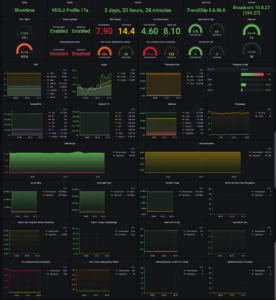Are you looking for a way to contribute positively to your community and secure your financial future? UK NIC Voluntary Contributions might just be the answer you’ve been searching for. This innovative approach allows individuals to enhance their National Insurance contributions, paving the way for better benefits down the line. Whether you’re self-employed, have gaps in your contribution history, or simply want to bolster your entitlements, this blog will explore how voluntary contributions can make a significant impact not just on personal finances but on society as well. Dive in with us as we unravel the ins and outs of UK NICs and discover how you can be part of something transformative!
Understanding the Importance of Nic Voluntary Contributions
National Insurance contributions play a crucial role in the UK’s social security system. They fund essential benefits such as state pensions, unemployment support, and healthcare services. However, gaps in your contribution history can limit access to these vital resources.
NIC voluntary contributions provide an opportunity to fill those gaps. Individuals might find themselves with missing years due to various reasons—like self-employment or time spent abroad. By making voluntary contributions, they ensure their eligibility for future benefits.
Beyond personal gain, these contributions strengthen the collective safety net for everyone. When more people contribute, the overall system becomes robust and sustainable.
Understanding this importance is key. It’s not just about securing your financial future; it’s also about supporting fellow citizens who rely on these systems during tough times.
How UK Nics Work and Who They Benefit
UK National Insurance Contributions (NICs) are a vital part of the country’s social security system. They help fund various benefits and services that support millions.
When you pay NICs, you’re contributing to the state pension and other welfare programs. This means that your payments go towards ensuring financial stability for retirees, people with disabilities, and those who are unemployed.
Self-employed individuals also play a crucial role in this system. By making voluntary contributions, they can secure their entitlement to certain benefits that might otherwise be unavailable.
Furthermore, regular NIC contributors often gain access to additional perks such as maternity allowance or bereavement support. The more you contribute over time, the greater your safety net becomes when life challenges arise.
Understanding how NICs work empowers citizens to make informed decisions about their financial futures while supporting community welfare at large.
The Benefits of Making Voluntary Contributions
Making voluntary contributions to NICs offers a range of advantages. One significant benefit is the ability to enhance your state pension. By paying extra, you can fill gaps in your contribution history, potentially boosting your retirement income.
Additionally, these contributions help secure vital benefits like maternity pay and jobseeker’s allowance. This safety net provides peace of mind during challenging times.
For self-employed individuals, voluntary NICs can pave the way for access to important social security benefits that might otherwise be out of reach.
Moreover, contributing voluntarily demonstrates a commitment to supporting the welfare system. It fosters community well-being and ensures resources are available for those who need them most.
There’s an empowering sense of control over one’s financial future. Individuals can tailor their contributions based on personal circumstances and long-term goals.
How to Make Nic Voluntary Contributions
Making UK NIC voluntary contributions is a straightforward process. First, determine your eligibility. If you’re missing National Insurance credits, this option can help you fill the gaps.
Next, gather your personal information. You’ll need details like your National Insurance number and employment history. Having these ready will streamline the application.
You can make contributions online through the HMRC website or by contacting them directly for guidance. They offer various payment methods, including bank transfers or credit cards.
Before making any payments, review how much you need to contribute based on your circumstances; rates may vary depending on specific conditions.
Stay informed about deadlines and potential changes in policies that might affect your decision. This proactive approach ensures you’re always up-to-date with requirements and benefits associated with voluntary contributions in the UK system.
Success Stories: Real People Making a Difference Through UK Nics
Many individuals have transformed their lives through UK NIC voluntary contributions. Take Sarah, for example. After making additional payments, she secured her state pension earlier than expected, allowing her to retire and pursue her passion for painting.
Then there’s Raj, who contributed extra to support his family during challenging times. His proactive approach not only ensured financial security but also inspired his community members to take similar steps toward safeguarding their futures.
Mark’s story stands out as well. By understanding the impact of these contributions on future benefits, he encouraged others in his workplace to invest in their own pensions too. This collective effort has fostered a culture of awareness and responsibility among colleagues.
These stories illustrate how individual actions can lead to significant change—not just personally but within communities—showcasing the power of conscious financial decisions through UK NICs.
Frequently Asked Questions about UK Nics
Many people are curious about UK NIC voluntary contributions. What exactly do they entail? These contributions are payments made to enhance your National Insurance record, potentially increasing future state benefits.
Another common question is who can make these contributions. Anyone with gaps in their National Insurance history due to various reasons like low income or time spent abroad can benefit from this option.
Some wonder if there’s a deadline for making these contributions. Generally, you have up to six years after the end of the tax year to claim missed payments, but it’s best to check current regulations.
People also ask about the impact on pensions. Making additional NICs can significantly boost your entitlement and ensure a more secure retirement income.
Many seek clarity on how much they need to pay. The amount varies based on individual circumstances and specific years of contribution needed. Always consider consulting an expert for tailored advice!
Conclusion: Empowering Change and Creating a Better Future with UK Nic Voluntary Contributions
UK NIC voluntary contributions offer a unique opportunity for individuals to make a lasting impact. By participating in this system, you not only enhance your own financial security but also contribute to the welfare of society as a whole. Every contribution counts and can help bridge gaps in funding for essential services.
This initiative empowers people from all walks of life to take action towards creating positive change. As stories of real individuals who have benefited from these contributions demonstrate, every effort helps to build a more robust social safety net.
The beauty lies in its simplicity: by making voluntary contributions, you’re investing in both your future and that of others. It’s an approach that encapsulates hope and responsibility simultaneously.
Engaging with UK NICs means you are part of something bigger—an evolving landscape where everyone has the chance to uplift themselves and their community. Whether you choose to start small or aim high, remember that each step forward is significant.
Embracing UK NIC voluntary contributions isn’t just about finances; it’s about fostering a culture of care and support for one another. Together, we can forge pathways toward brighter tomorrows through thoughtful actions today.




